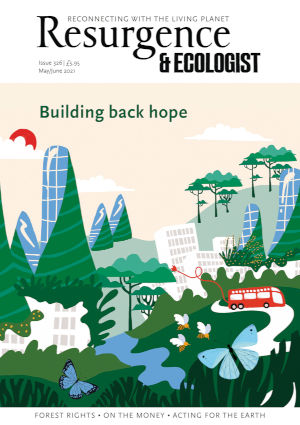So many of us long for green recovery, and it seems so far away. Nowhere is this more true than in climate politics. That’s why I’ve been thinking every day for the past year about how solidarity can help stop climate breakdown.
That was part of writing Fight the Fire: Green New Deals and Global Climate Jobs, recently published by The Ecologist. Most of the work entailed researching all the details for how transition to a low-carbon world would look. That was the work, but not the hard part. The hard bit was trying to imagine how we humans can actually make such things happen. Because it doesn’t look good right now.
As the leaders of the world keep promising action, the levels of CO2 in the air keep climbing. Lobbying the United Nations and the leaders of the world has not worked. Most climate activists now know that we have to build our movements country by country and somehow find a way to force our governments to act. We face many problems. One of them is that we have to build movements to cut emissions in both the rich countries of the global north and the not-rich countries of the global south.
We used to think that mainly meant cutting emissions in the rich countries. But in 2019 the rich countries produced 38% of global greenhouse-gas emissions, while the not-rich countries produced 62%. And we have to cut emissions by nearly 90% – and fast – to avoid climate breakdown.
That won’t happen without deep cuts in countries like China and South Africa, which already have higher emissions per capita than Europe.
Moreover, people in countries with lower emissions, like India and Kenya, want the same standard of living as people in China. If China does not cut its emissions, all those other countries will raise theirs.
But cuts and limits in poorer countries are unfair. Ordinary people in Europe are already far richer than their counterparts in China and India. Historically, Europe has far higher emissions. Those emissions made Europe richer, and colonialism made Africa and Asia poorer.
So it is monstrously unfair that some not-rich countries should have to make deep cuts in emissions, and others should not increase their emissions.
Yet if they do not do those things, their citizens are lost. Indeed, we are all lost, but the poor in the poorest countries will suffer most.
How do we resolve this contradiction?
One answer is climate jobs, north and south. We need to campaign for government, public-sector programmes to hire large numbers of workers to do ‘climate jobs’ – a million workers in the UK, and 20 million in India. Those workers would do hundreds of different kinds of jobs – all of them directly useful to cutting greenhouse-gas emissions. The most important ones would be to build and operate carbon-free electricity grids and transport systems, and to convert all buildings and industries to something close to carbon-free operation.
But new projects on this scale pose a threat, not just to Big Carbon, but to the established ways of managing the economy in every part of the planet. And any massive climate jobs project in South Africa, Bolivia, Nigeria or Bangladesh would probably face the full fury of the global financial system. We have seen this dozens of times when governments in poorer countries have attempted to escape austerity.
The antidote to that will have to be solidarity from mass movements for climate jobs in the rich countries of Europe, North America and East Asia.
If that sounds unlikely to you, it is because you live in the real world.
I spend a lot of the book thinking about how climate movements could change that world, and change us, so that kind of solidarity is possible.
I won’t simplify the answer for you here, because the problems are actually complex, and so are the solutions. I have tried to convey that complexity in Fight the Fire.
But at the core of all the solutions is the necessity of climate movements with the enthusiastic support of majorities all over the world. So I have thought hard about ways of building those majorities.
Climate jobs and new deals in the global south are crucial to that. Workers in Thailand and small farmers in Nigeria will not support green alternatives that leave them in poverty. We have to campaign for, and win, a pathway that will deliver economic prosperity entirely based on renewable energy.
We need to cover much of the world with trees, and we need the people who now live in and around the forest to do forestry climate jobs. We need to unite environmentalists in California who want to stop factory farming, and small herders in Africa and Asia who want to graze their sheep and cattle.
Then there are the people in the south – but not only in the south – threatened by extractivist projects like megadams, mountaintop removal, nuclear power stations, and poisonous lithium mining. We are told these are necessary for the green transition. In Fight the Fire I argue that they are necessary for profits, but that there are greener, more expensive ways of solving all those problems.
It’s like if your child has cancer. If you have to pay for treatment, you pay for treatment, no matter the cost. With climate, governments can pay for the treatment.
And if we had massive climate movements and strong union support in the rich countries, we could insist on the green, although more costly, solutions out of solidarity with the vulnerable people on the land.
Then there are the small farmers threatened by climate change. It is all too easy to talk about resilience and ecological agriculture, and to forget that no farmer in the world can grow crops without water.
All of these kinds of solidarity have to move beyond the image of one-way helping. People in the south will be lost without a mass radical movement in the north. And the reverse is just as true. We must help each other, because if we don’t we are all in desperate trouble.
Solidarity does not mean helping the vulnerable because they are weak. It means taking care of each other because we are all vulnerable and we need each other to be strong.
As Covid-19 has reminded us, caring for each other is at the heart of being human. Another word for solidarity – perhaps a better word – is love.
Fight the Fire is available to download via the Ecologist website: www.theecologist.org/fight-the-fire
Jonathan Neale is a writer and climate jobs activist. He tweets at @NealeSayles.







